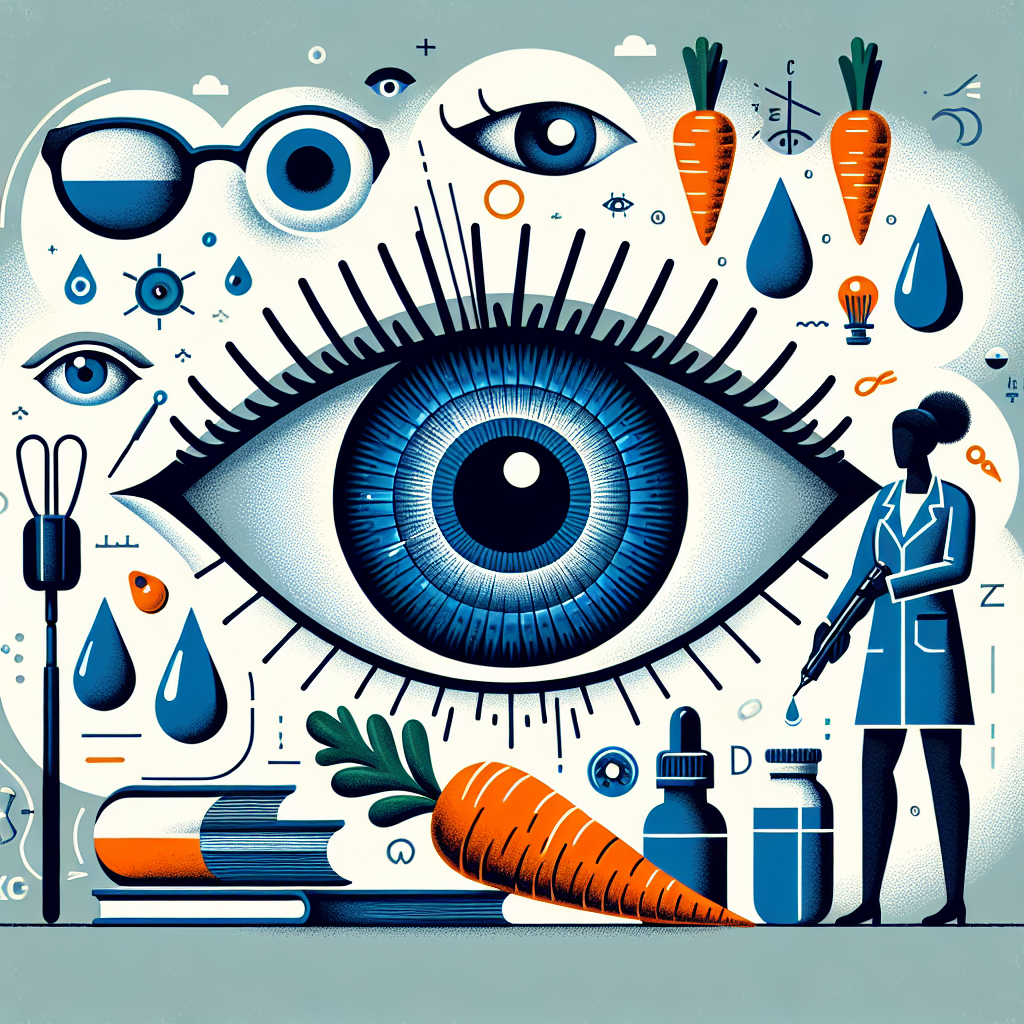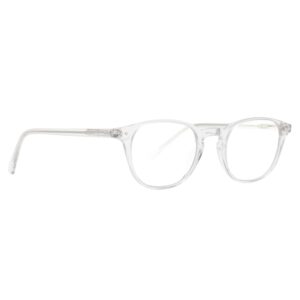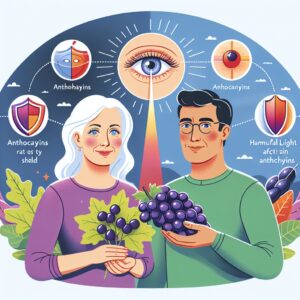
Key Takeaways
- Free radicals can damage eye cells, leading to vision impairment and eye diseases.
- Antioxidants are vital for neutralizing free radicals and protecting eye health.
- Vitamins C and E, lutein, zeaxanthin, and zinc are among the top antioxidants for eye health.
- Incorporating antioxidant-rich foods into your diet can help maintain optimal vision.
- Regular eye check-ups and protective habits, like wearing sunglasses, contribute to eye defense against free radicals.
Shield Your Vision: Antioxidants vs. Free Radicals
Free Radicals: The Invisible Threat to Your Eyes
Imagine tiny invaders in your body, capable of damaging your cells and leading to chronic diseases. These are free radicals, unstable molecules that can harm various parts of your body, including your eyes. Because of their unpaired electrons, they’re always on the hunt for other electrons, causing oxidative stress. This stress can damage your eye cells, potentially leading to cataracts, age-related macular degeneration (AMD), and other vision problems.
Antioxidants: Your Eyes’ Protective Allies
Antioxidants are the superheroes of the cellular world. They donate electrons to free radicals without becoming unstable themselves, effectively neutralizing the threat. By doing so, they help protect your eyes from the oxidative stress that can lead to vision impairment.
Understanding Free Radicals and Their Impact on Eye Health
What Exactly Are Free Radicals?
Free radicals are molecules with an odd number of electrons. They can be formed through natural processes in your body or introduced through external sources like tobacco smoke, pollution, and UV radiation. When free radicals accumulate, they can cause oxidative stress, which damages cells, proteins, and DNA.
“Oxidative stress contributes to the development and progression of several eye diseases, including cataracts and AMD.” – National Eye Institute
Most importantly, the eyes are particularly vulnerable to oxidative stress because of their exposure to light and high oxygen consumption. This makes the role of antioxidants in maintaining eye health even more crucial.
Link Between Free Radicals and Eye Conditions
Research has established a strong connection between oxidative stress caused by free radicals and various eye conditions. For instance, cataracts, which cause clouding of the eye’s lens, and AMD, which affects the retina, are both linked to oxidative damage. Protecting your eyes against free radicals is therefore essential for preventing these conditions.
Antioxidants Explained: How They Safeguard Your Vision
Defining Antioxidants and Their Function
Antioxidants are compounds that inhibit oxidation, a chemical reaction that can produce free radicals. They’re found in various foods, particularly fruits, vegetables, nuts, and whole grains. By neutralizing free radicals, antioxidants help prevent the cellular damage that can lead to deteriorating vision.
Antioxidant Benefits Specific to the Eyes
Several antioxidants are known for their benefits to eye health:
- Vitamin C: Found in citrus fruits, bell peppers, and broccoli, vitamin C contributes to healthy blood vessels in your eyes.
- Vitamin E: Present in nuts, seeds, and leafy green vegetables, vitamin E protects cells in the eyes from damage caused by free radicals.
- Lutein and Zeaxanthin: These carotenoids, located in spinach, kale, and eggs, are known to protect against cataract and AMD.
- Zinc: This mineral, found in meat, shellfish, and legumes, helps bring vitamin A from the liver to the retina, to produce melanin, a protective pigment in the eyes.
Therefore, ensuring you get enough of these antioxidants is key to maintaining healthy vision.
Vitamin E: The Essential Eye Protector
Vitamin E is a powerful antioxidant that helps protect the cells in your eyes from damage by free radicals. This nutrient is key to maintaining healthy vision, especially as you age. You can find Vitamin E in abundance in nuts like almonds and seeds such as sunflower seeds. It’s also present in green leafy vegetables like spinach and kale.
Lutein and Zeaxanthin: The Macular Shield
Lutein and zeaxanthin are carotenoids that are concentrated in the macula, an area of the retina responsible for central vision. They act like natural sunglasses, filtering harmful high-energy blue wavelengths of light and protecting the eyes. The best way to ensure you’re getting enough of these vital nutrients is by eating plenty of leafy greens, corn, eggs, and orange peppers.
Omega-3 Fatty Acids: Visual Acuity and Beyond
Omega-3 fatty acids are not traditionally labeled as antioxidants, but they play a crucial role in maintaining cell membrane health, which is vital for vision. DHA, a type of omega-3, is a major structural component of the retina. You can get your dose of omega-3s from fish like salmon, mackerel, and sardines, as well as flaxseeds and walnuts.
Zinc: The Vision Support Mineral
Zinc is an essential trace mineral that’s highly concentrated in the eyes. It plays a vital role in bringing vitamin A from the liver to the retina in order to produce melanin, which protects the eyes. Foods rich in zinc include oysters, beef, and pumpkin seeds.
Incorporating Antioxidants into Your Daily Diet
Knowing which foods contain these important antioxidants is the first step. The next step is incorporating them into your daily diet. A balanced diet that includes a variety of fruits, vegetables, nuts, and seeds will help ensure you’re getting the necessary nutrients to support eye health.
Antioxidant-Rich Foods for Your Grocery List
- Leafy greens like spinach and kale for lutein and zeaxanthin
- Citrus fruits and berries for Vitamin C
- Nuts and seeds for Vitamin E and zinc
- Fatty fish for omega-3 fatty acids
Adding these foods to your grocery list is a simple way to boost your intake of antioxidants.
Meal-Prep Ideas Packed with Eye-Health Nutrients
Preparing meals in advance can help you ensure you’re eating the foods that support your eye health. For example, a salad packed with leafy greens, sliced strawberries, and a handful of almonds can provide a good mix of vitamins and minerals. Or, try a smoothie with kale, orange juice, and flaxseeds for a refreshing and nutritious drink.
Lifestyle Habits for Optimal Eye Health
Besides diet, there are other lifestyle habits that can significantly affect your eye health. Protecting your eyes from the sun and avoiding smoking are just two important strategies for keeping your eyes healthy.
UV Protection: How to Guard Against the Sun
Wearing sunglasses that block 100% of both UVA and UVB rays is crucial when you’re outdoors. Sunlight can cause oxidative stress in the eyes, leading to cataract formation and other eye disorders. Always choose sunglasses with proper UV protection to safeguard your eyes.
No Smoke Zone: Why Smokers Need More Antioxidants
Smoking increases the production of free radicals in the body, which can lead to oxidative stress and harm the eyes. If you smoke, it’s especially important to focus on a diet high in antioxidants to combat this damage. Of course, the best choice for your eyes and overall health is to quit smoking.
Eye Exercises and Regular Check-ups: Keeping an Eye Out
Regular eye exams are essential for maintaining eye health. An eye care professional can detect early signs of damage and prescribe measures to protect your vision. Additionally, simple eye exercises can help reduce eye strain, especially if you spend long hours in front of a screen.
“Regular eye exams can catch problems before they become serious, and early detection is key to preserving your vision.” – American Optometric Association
Therefore, it’s important to schedule regular check-ups and engage in habits that support eye health.
Navigating Supplements: Do’s and Don’ts for Eye Health
While a balanced diet is the best way to get the nutrients your eyes need, sometimes supplements can help fill in the gaps. However, it’s important to navigate the world of supplements with care to ensure they benefit your eye health without causing harm.
Choosing the Right Supplements for Your Eyes
When selecting supplements, look for those that have been tested for purity and potency. It’s also essential to choose supplements that contain the antioxidants known to support eye health, such as lutein, zeaxanthin, vitamins C and E, and zinc.
Before starting any new supplement, consult with a healthcare professional, especially if you have existing health conditions or take other medications. They can help determine the right supplement and dosage for you.
Understanding Dosages and Combinations
Dosages are important when it comes to supplements. Taking too much of certain vitamins and minerals can be harmful. For example, excessive vitamin A intake can lead to toxicity. Always adhere to the recommended daily allowances and the advice of your healthcare provider.
Some supplements work better in combination. For instance, vitamin C enhances the absorption of vitamin E, and zinc works well with antioxidants to protect the eyes. A healthcare professional can advise you on the best combinations for your needs.
Putting It All Together: A Plan for Your Eye Health
Protecting your eyes from free radicals involves a combination of diet, lifestyle choices, and, if necessary, supplements. Start by incorporating antioxidant-rich foods into your meals, protect your eyes from UV rays, and avoid smoking. If you’re considering supplements, do so under the guidance of a healthcare professional.
Regular eye check-ups are also crucial. They can help catch any potential issues early on and keep your vision sharp. Remember, taking care of your eyes today can help preserve your vision for the future.
Frequently Asked Questions
Can a Diet High in Antioxidants Reverse Eye Damage?
While a diet high in antioxidants can help prevent further damage, it may not reverse existing damage to the eyes. However, it can support overall eye health and potentially slow the progression of certain eye diseases.
Eating a variety of colorful fruits and vegetables is the best way to ensure you’re getting a broad spectrum of antioxidants that can benefit eye health.
It’s always a good idea to talk to your doctor about your specific dietary needs, especially if you have an eye condition.
How Often Should I Get My Eyes Checked?
Adults should have a comprehensive eye exam every one to two years, depending on age, risk factors, and whether you currently wear glasses or contact lenses. Children should have regular eye exams to ensure proper eye development and to catch any issues early on.
As we age, the risk for eye diseases increases, so more frequent check-ups may be necessary.
Are There Any Side Effects to Taking Vision Supplements?
Most vision supplements are safe when taken as directed. However, high doses of certain nutrients can have side effects. For example, too much zinc can interfere with copper absorption and lead to gastrointestinal issues.
It’s important to follow the recommended dosages and consult with a healthcare professional before starting any new supplement regimen.
Can Wearing Sunglasses Help Protect My Eyes from Free Radicals?
Yes, wearing sunglasses that offer 100% UV protection can help shield your eyes from the sun’s harmful rays, which can generate free radicals. This is a simple yet effective way to protect your eye health, especially during peak sunlight hours.
At What Age Should I Be Concerned About Age-Related Eye Conditions?
Age-related eye conditions can start to occur as early as your 40s or 50s, but they are more common as you get older. It’s important to be aware of the signs and symptoms of eye conditions like cataracts, glaucoma, and AMD as you age, and to maintain regular eye exams.
Remember, proactive steps taken today can help protect your vision well into the future. So eat well, live healthily, and keep an eye on your eye health!


